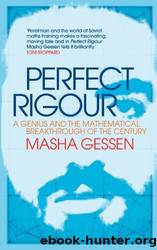Perfect Rigour: A Genius and the Mathematical Breakthrough of the Century by Gessen Masha

Author:Gessen, Masha [Gessen, Masha]
Language: eng
Format: epub
Tags: Mathematics, history of mathematics, Science, World War II, Biography, History, Military History, Engineering
ISBN: 9781848312388
Amazon: 1848312385
Goodreads: 10388040
Publisher: Icon Books
Published: 2009-01-01T08:00:00+00:00
PERFECT RIGOR
THE PROBLEM
8
The Problem
THE VERY POSSIBILITY of mathematical science seems1 an insoluble contradiction.â So, more than a century ago, wrote Henri Poincaré, known among mathematicians as the last universalist, for he excelled in all areas of mathematics. If the objects of study are confined to the imagination, âfrom whence is derived that perfect rigor which is challenged by none?â And when rules of formal logic have replaced the experiment, âhow is it that mathematics is not reduced to a gigantic tautology?â Finally, âare we then to admit that . . . all the theorems with which so many volumes are filled are only indirect ways of saying that A is A?â
Poincaré went on to explain that mathematics was a science because its reasoning traveled from the particular to the general. A mathematician who conducted his mental experiments with sufficient rigor could derive the rules that governed the rest of the imaginary terrain he shared with other mathematicians. In other words, he not only proved that A was A but also explained what made A quintessentially an A and where other Aâs might be found or how they might be constructed. âWe know what it is to be in love or to feel pain,2 and we donât need precise definitions to communicate,â wrote an American mathematics professor who, after authoring many academic books, undertook to explain topology to a general audience. âThe objects of mathematics lie outside common experience, however. If one doesnât define these objects carefully, one cannot manipulate them meaningfully or talk to others about them.â This may or may not be so. Most of us are, in fact, perfectly satisfied with our casual understandings of distances long and short, of slopes smooth and steep, and of lines and circles and spheres. Weâre satisfied with a gut feeling that puncturing a hole can sometimes but not always change the nature of an objectâthat is, a punctured balloon is entirely different from an intact one, while, say, a jelly-filled doughnut without a hole is, to us, essentially similar to a doughnut with a hole in the middle, with or without jelly. All of these things are in their simplest forms parts of our common experience. But in the disjointed world of the mathematician, shifting understandings and imprecise coordinates muddle the picture intolerably. In his world, nothing is like anything else unless proven similar; nothing is familiar until thoroughly defined; nothingâor very nearly nothingâis self-evident.
At the dawn of mathematics, Euclid attempted to start with things that were self-evident. He began his Elements with thirty-five definitions, five postulates, and five common notions, or axioms. Definitions ranged from that of a point (âthat which has no parts, or which has no magnitudeâ3) to that of parallel straight lines (âsuch as are in the same plane, and which being produced ever so far do not meetâ4). Then he made a series of statements such as âthings that are equal to the same thing are equal to one another.â5 And the five postulates
Download
This site does not store any files on its server. We only index and link to content provided by other sites. Please contact the content providers to delete copyright contents if any and email us, we'll remove relevant links or contents immediately.
Hit Refresh by Satya Nadella(9134)
When Breath Becomes Air by Paul Kalanithi(8446)
The Girl Without a Voice by Casey Watson(7889)
A Court of Wings and Ruin by Sarah J. Maas(7846)
Do No Harm Stories of Life, Death and Brain Surgery by Henry Marsh(6941)
Shoe Dog by Phil Knight(5268)
The Rules Do Not Apply by Ariel Levy(4969)
A Higher Loyalty: Truth, Lies, and Leadership by James Comey(4964)
Hunger by Roxane Gay(4928)
Tuesdays with Morrie by Mitch Albom(4784)
Everything Happens for a Reason by Kate Bowler(4743)
The Immortal Life of Henrietta Lacks by Rebecca Skloot(4588)
Millionaire: The Philanderer, Gambler, and Duelist Who Invented Modern Finance by Janet Gleeson(4478)
How to Change Your Mind by Michael Pollan(4356)
All Creatures Great and Small by James Herriot(4322)
The Money Culture by Michael Lewis(4207)
Man and His Symbols by Carl Gustav Jung(4135)
Elon Musk by Ashlee Vance(4127)
Tokyo Vice: An American Reporter on the Police Beat in Japan by Jake Adelstein(3996)
